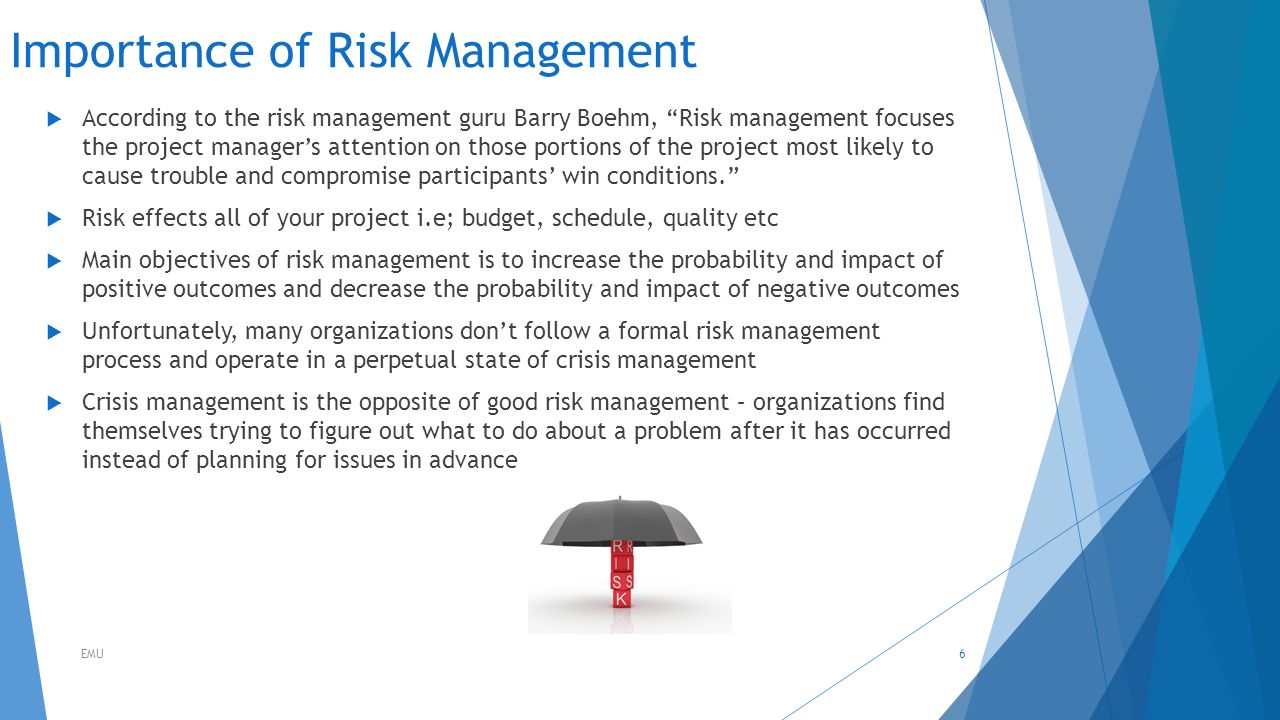How the Importance of Risk Management Drives Successful Project Outcomes
Wiki Article
Discovering the Importance of Risk Management for Effective Decision-Making Techniques
In the elaborate world of service, Risk Management emerges as a crucial factor in the decision-making procedure. The capacity to recognize prospective risks and opportunities, and strategize accordingly, can lead to the distinction in between success and failure.Comprehending the Idea of Risk Management
Risk Management, an important element in decision-making, is often misconstrued or oversimplified. Risk Management entails structured and disciplined methods, using information and insightful analyses. From monetary unpredictabilities, legal responsibilities, tactical Management mistakes, to accidents and all-natural disasters, it resolves various threats - importance of risk management.The Duty of Risk Management in Decision-Making Processes
In the realm of calculated preparation and company operations, Risk Management plays an important duty in decision-making processes. It assists in recognizing possible threats and unpredictabilities that can influence the accomplishment of service objectives. By tracing these dangers, business can formulate techniques to mitigate their impact, making sure business connection and stability. Risk Management therefore comes to be a vital device in decision-making, assisting leaders to make educated choices based on a thorough understanding of the risks included. It urges an aggressive strategy, making it possible for organizations to prepare and prepare for for possible future circumstances. This substantially lowers the chance of negative repercussions, promoting a lot more effective and reliable decision-making techniques. Risk Management offers as a vital part in the decision-making procedures of any kind of company.
How Risk Management Enhances Strategic Planning
In the context of tactical planning, Risk Management plays a pivotal function. Launching with the identification of potential threats, it additionally encompasses the application of Risk mitigation measures. The role of Risk Management is not fixed yet dynamic, as it demands continuous tracking and adjusting of methods.Recognizing Potential Risks

Carrying Out Risk Mitigation
Having actually developed the significance of determining potential risks, the following action is to check out Risk reduction. This process involves establishing and implementing approaches to handle determined dangers successfully. It is an important aspect of strategic preparation as it boosts decision-making by reducing possible unfavorable results. Risk mitigation techniques can vary from Risk evasion, Risk transfer, to risk decrease. Each technique should be customized to the certain Risk, considering its potential effect and the company's Risk resistance. Additionally, reliable Risk mitigation needs a deep understanding of the Risk landscape and the potential influence of each Risk. This understanding allows organizations to prioritize dangers and assign resources efficiently, making sure that the most substantial hazards are addressed initially.Monitoring and Readjusting Techniques
Though Risk mitigation is a vital action in tactical preparation, constant surveillance and modification of these methods is equally essential. This ongoing process enables organizations to determine brand-new risks and reassess existing ones, guaranteeing the implemented techniques remain efficient in the ever-changing company environment. It likewise offers an opportunity to review the success of the Risk Management actions, enabling adjustments to be made where needed, additional enhancing tactical preparation. Efficient tracking and change call for making use of analytics and vital performance signs (KPIs) to determine effectiveness. These tools give beneficial data-driven understandings that can educate critical decision-making. Consequently, tracking and changing Risk Management techniques is a critical part for enhancing an organization's strength and calculated preparation.Situation Researches: Effective Risk Management and Decision-Making
find out In the world of company and money, successful Risk Management and decision-making frequently act as the pillars of prosperous business. One such entity is an international oil business that alleviated economic loss by hedging versus varying oil costs. In an additional instance, a tech startup flourished by identifying and approving high-risk, high-reward methods in an unpredictable market. A global bank, confronted with governing unpredictabilities, successfully browsed the scenario via proactive Risk analysis and vibrant decision-making. These cases highlight the value of sharp Risk Management in decision-making processes. It is not the lack of Risk, yet the Management of it, that commonly distinguishes successful business from unsuccessful ones. These situations underscore the crucial role of Risk Management in critical decision-making. importance of risk management.Devices and Techniques for Efficient Risk Management
These devices, such as Risk signs up and heat maps, help in determining and assessing potential risks. Risk response methods, a crucial component of Risk Management, involve approving, staying clear of, transferring, or mitigating dangers. With these devices and techniques, decision-makers can navigate the complex landscape of Risk Management, thus helping with informed and reliable decision-making.Future Fads in Risk Management and Decision-Making Approaches
As we check out the substantial landscape of Risk Management, it becomes evident that the tools and strategies utilized today will continue to develop. Future patterns point in the direction of a raised reliance on modern technology, with man-made knowledge and artificial intelligence playing considerable roles. These technologies will certainly allow organizations to predict prospective dangers with greater accuracy and make more educated decisions. Additionally, there will be a growing focus on resilience, not simply in managing dangers but additionally in jumping back from unfavorable scenarios. Last but not least, the concept of Risk culture, where every member of an organization is aware and go to this web-site associated with Risk Management, will certainly gain extra prestige. These trends proclaim an even more positive and inclusive approach in the direction of Risk Management and decision-making.Conclusion

Risk Management hence ends up being a crucial device in decision-making, aiding leaders to make educated choices based on a detailed understanding of the dangers involved. Risk reduction methods can vary from Risk avoidance, Risk transfer, to run the risk of decrease (importance of risk management). Reliable Risk reduction requires a deep understanding of the Risk landscape and the potential influence of each Risk. Risk action methods, a vital part of Risk Management, include approving, avoiding, transferring, or mitigating risks. The concept of Risk society, where every participant of an organization is mindful and included in Risk Management, will certainly obtain a lot more importance
Report this wiki page